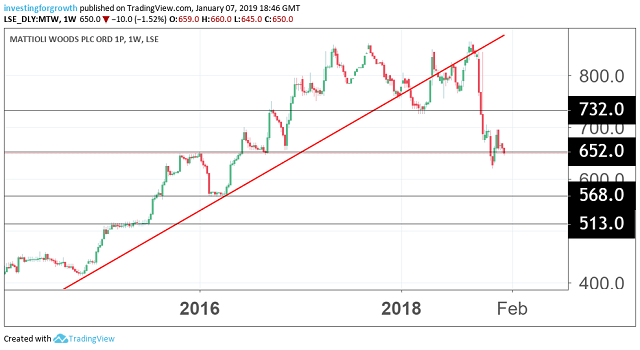Stockwatch: A bargain share at multi-year low?
8th January 2019 08:56
by Edmond Jackson from interactive investor
This is a useful stock to follow and trade, believes companies analyst Edmond Jackson who thinks the time may soon be right to buy back into this financials stock.

Does a latest trading update from £175 million, AIM-listed wealth manager Mattioli Woods affirm or defy a sudden stock de-rating?
Last September, I argued 'take profits' at 855p, close to the 857p peak, after the group reported annual pre-tax profit up 27% to £9.8 million on revenue up 16.2% to £58.7 million, and despite an 82.4% cash conversion of operating profit leading to net cash of £20.2 million.
Having drawn attention to Mattioli Woods as a 'buy' variously from 455p in July 2014, when on a forward price/earnings (PE) ratio of around 17 times, to 685p in September 2016 when commercial momentum appeared to justify buying on a PE around 21 times, last September it seemed market exuberance towards small caps was pricing in more "reward" than "risk".
I concluded that "especially in financial services, growth valuations may be at an inflection point if the central banks' driven bull market is now exposed to cracks." At the very least, don't be over-exposed to financials.
27% de-rating from September 2018 high to November low
Following through, I also included Mattioli Woods in an-2018 macro piece where I noted smaller financial stocks had been hit especially hard in Q4, despite no evidence (as yet) of deterioration in underlying business. As a litmus test of confidence in any economy, financial stocks are often first to turn up from market lows in a recession and among those worst-affected as an economy approaches downturn – small caps are prone to a be a more focused example of change, which is why they are an interesting study.
The share price has eased a negligible 10p to 650p in response to the 7 January trading update for the interim results to 30 November 2918. The stock fell as low as 625p at the end of November then rebounded to 680p in December, as if this area is perceived fair pricing.

Source: TradingView (*) Past performance is not a guide to future performance
The update affirms the company broker's forecast for a moderately double-digit earnings advance for the current year to end-May, which is also what's expected for the 2020 full year.
Dividing a prospective PE in the mid-teens by the expected earnings growth rate derives a slightly expensive PEG ratio of around 1.2 times (see table) which could be justified by Mattioli Woods' high element of sustainable income. "Unlike many wealth managers, most of our revenues are fee-based, rather than being linked to the value of assets under management, administration or advice," it says. This is credible for now, although the market will take its cue from whatever numbers achieved, and any shift in the narrative.
Lower-than-expected revenue growth offset by efficiencies
The market is proven correct by way of the update citing "a lower level of client activity over the last six months due to generally poor investment sentiment and prolonged uncertainty over Brexit."
Slightly lower than expected revenue growth is blamed on reducing clients' costs (more likely a response to competition, than altruism) and general market conditions, albeit "more than offset by a continued focus on operational efficiencies and other administrative cost savings, resulting in strong profit growth and our EBITDA margin tracking substantially ahead of our 20% target."
This maintains the message from last September's prelims where the EBITDA margin had risen from 20.6% to 21.6%, although the operating margin was a relatively lower 16.4%: still good, although the table shows it at 17.4% in 2014.
- Stockwatch: Are highly-rated financial stocks at an inflection point?
- Tips on how to avoid the duds and spot winning shares on AIM
So, the group is currently able to absorb modest revenue weakness to assert profits in line with expectations, though there is potentially a question mark against 2020 if weaker market conditions persist. It depends how durable are cost-savings in the equation versus management fees.
The recent period has seen cloud-hosted IT introduced (if fairly standard practice nowadays) and an integrated human resources/payroll function (again, quite to be expected, as a result of acquisitions). A new Leicester head office is said to herald further efficiencies besides £850,000 a year rental savings.
| Mattioli Woods - financial summary | Broker estimates | ||||||
|---|---|---|---|---|---|---|---|
| year ended 31 May | 2014 | 2015 | 2016 | 2017 | 2018 | 2019 | 2020 |
| Turnover (£ million) | 29.3 | 34.6 | 43.0 | 50.5 | 58.7 | ||
| IFRS3 pre-tax profit (£m) | 5.1 | 5.3 | 6.3 | 7.7 | 9.8 | ||
| Normalised pre-tax profit (£m) | 5.2 | 5.5 | 6.6 | 8.1 | 9.6 | 9.8 | 10.9 |
| Operating margin (%) | 17.5 | 15.8 | 15.0 | 15.5 | 16.4 | ||
| IFRS3 earnings/share (p) | 21.7 | 19.4 | 21.1 | 24.4 | 31.1 | ||
| Normalised earnings/share (p) | 20.8 | 20.5 | 20.8 | 33.3 | 37.0 | 41.7 | 46.5 |
| Earnings per share growth (%) | 4.9 | -1.7 | 0.7 | 61.0 | 11.1 | 12.7 | 11.5 |
| Price/earnings multiple (x) | 17.6 | 15.6 | 14.0 | ||||
| Price/earnings-to-growth (x) | 1.6 | 1.2 | 1.2 | ||||
| Annual average historic P/E (x) | 20.6 | 26.1 | 31.5 | 34.3 | 33.0 | ||
| Cash flow/share (p) | 19.3 | 30.2 | 40.7 | 34.3 | 62.1 | ||
| Capex/share (p) | 4.6 | 4.4 | 6.5 | 34.0 | 0.6 | ||
| Dividend per share (p) | 7.8 | 9.3 | 11.0 | 14.1 | 17.0 | 18.5 | 20.6 |
| Yield (%) | 2.6 | 2.8 | 3.2 | ||||
| Covered by earnings (x) | 2.7 | 2.3 | 1.9 | 2.0 | 2.2 | 2.3 | 2.3 |
| Net tangible assets per share (p) | 32.7 | 52.1 | 88.0 | 109 | 138 | ||
Source: Company REFS Past performance is not a guide to future performance
Assets-under-management growth has tailed off
The update cites total client assets of £8.8 billion at the 30 November, barely up on £8.7 billion at the 31 May financial year-end which had risen 10% over the 2017/2018 financial year. This is despite Amati Global Investors, an associate group company, being starred in the update for achieving £348 million gross funds under management; also "the bespoke investment services the group has developed, enjoying aggregate net inflows over £140 million with gross discretionary assets rising to £2.4 billion."
It's hard to be sure without full transparency, but if total client assets are at a current ceiling, then some must have been impacted by a change in underlying value. This is where it gets tricky to assess any loss of assets by way of redemptions, which would ultimately affect fee-based revenues despite management's claim the value of assets is immaterial. More time is needed for shift to more cautious investment behaviour to manifest in the group figures.
Chief investment officer buys £25,160 worth of equity
There has been one modest well-timed trade into the drop by the chief investment officer and his wife who acquired 4,000 shares at 629p last 30 November near the recent chart low. Despite looking tentative, it's a sensible move lest a cyclical slowdown is indeed taking shape, potentially to average one's way in. From the announcement it doesn't appear the CIO had a prior holding unlike say group chief executive Ian Mattioli, with 12.7% of the equity and co-founder Bob Woods (no longer a director) with 9.9%.
Meanwhile, Liontrust Asset Management a circa £300 million small cap listed investment manager, trimmed its stake from 11.4% to 10.9% last 13 November, not looking too astute but could have related to its own need to meet redemptions or a desire to reduce specific risk as Mattioli's largest shareholder. Company REFS currently cites 10.1%, a bit of a concern if representing an overhang, but this doesn't equate with the company's announcements.
Of encouragement to existing shareholders therefore, is that principals are standing pat and the CIO looks a rational buyer with a belief in value.
Interims due Tuesday 5 February
With fresh money I wouldn't hurry to re-enter. Instead, wait for more detail on the general change in financial sentiment – especially because the limbo over Brexit will persist if Mrs May's EU withdrawal deal fails to pass parliament and MP's thwart a no-deal Brexit.
In principle, this is a useful stock to follow and trade, but like various UK financials right now they are a binary play on the Brexit outcome it's impossible to predict. At least Mattioli Woods' interims might coincide with a better sense of political direction, and update on the December/January trend in assets under management.
UK financials could still be worth accumulating later this month in the event of Brexit jitters, with a steady approach being to average in. Buy on weakness.
*Horizontal lines on charts represent levels of previous technical support and resistance. Trendlines are marked in red.
Edmond Jackson is a freelance contributor and not a direct employee of interactive investor.
These articles are provided for information purposes only. Occasionally, an opinion about whether to buy or sell a specific investment may be provided by third parties. The content is not intended to be a personal recommendation to buy or sell any financial instrument or product, or to adopt any investment strategy as it is not provided based on an assessment of your investing knowledge and experience, your financial situation or your investment objectives. The value of your investments, and the income derived from them, may go down as well as up. You may not get back all the money that you invest. The investments referred to in this article may not be suitable for all investors, and if in doubt, an investor should seek advice from a qualified investment adviser.
Full performance can be found on the company or index summary page on the interactive investor website. Simply click on the company's or index name highlighted in the article.
Disclosure
We use a combination of fundamental and technical analysis in forming our view as to the valuation and prospects of an investment. Where relevant we have set out those particular matters we think are important in the above article, but further detail can be found here.
Please note that our article on this investment should not be considered to be a regular publication.
Details of all recommendations issued by ii during the previous 12-month period can be found here.
ii adheres to a strict code of conduct. Contributors may hold shares or have other interests in companies included in these portfolios, which could create a conflict of interests. Contributors intending to write about any financial instruments in which they have an interest are required to disclose such interest to ii and in the article itself. ii will at all times consider whether such interest impairs the objectivity of the recommendation.
In addition, individuals involved in the production of investment articles are subject to a personal account dealing restriction, which prevents them from placing a transaction in the specified instrument(s) for a period before and for five working days after such publication. This is to avoid personal interests conflicting with the interests of the recipients of those investment articles.